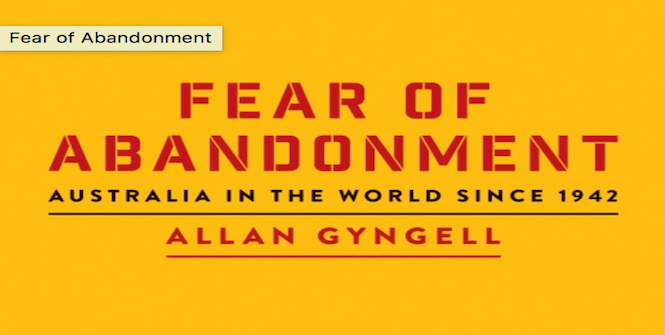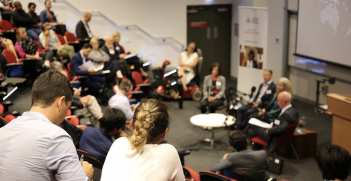Reading Room: Fear of Abandonment

With Fear of Abandonment, Allan Gyngell has produced the first systematic history of Australian foreign policy since T. B. Millar’s Australia in Peace and War in 1978. In an era in which there is a declining public knowledge of and interest in Australian foreign policy, such an engaging and informative history is a welcome development.
Gyngell’s title reflects what he argues is the motivating force of Australia’s foreign policy, the negative connotations of which he rejects: “it has … been the driver of one of the most consistent and commendable aspects of Australia’s worldview—its rejection of isolationism; its conviction that Australia needs to be active in the world in order to shape it, and that gathering combinations of allies, friends and ad hoc partners is the best way to do this.”
He begins the story in 1942, the year that Australia ratified the Statute of Westminster and thus had “full sovereignty over its international policy.” There are good reasons to be sceptical that this is the beginning of Australian foreign policy; stretching back to the 1880s, one can find instances of vigorous Australian foreign initiatives very much at odds with Whitehall but it does furnish a convenient date from which to begin a survey of modern Australian foreign policy.
Gyngell’s narrative moves at a brisk pace, wrestling immediately with war, decolonisation and the Cold War and moving up to the present day. It deals with a complex picture of crises, relationships and initiatives, providing just enough detail without weighing down the prose with unnecessary complexities. Throughout, Gyngell relies on the judgement and narrative skills of a seasoned diplomat and intelligence analyst, always expected to provide clear and balanced judgements with just the right amount of argumentation to justify them.
One of the most enjoyable aspects of Fear of Abandonment is the pen portraits that Gyngell sketches of the various significant prime ministers and foreign ministers involved in foreign policy since 1942. Once again, the honed skills of the diplomat are on show: the telling personal detail that speaks to a broader point nestles alongside more abstract observations. The prime minister Gyngell was closest to, Keating, is the pick of the pen portraits. Gyngell repeatedly demonstrates that personalities and relationships do matter in international affairs, a point so often lost on structural theories of international relations.
Gyngell has obviously immensely enjoyed writing this book. He relishes including tidbits of the absurd and the unorthodox amidst the flow of events. A longtime insider, he also has a great feel for the politics that so often structures and limits what diplomats can achieve. As the narrative moves into the 1970s and beyond, it gains the feel of semi-autobiography: it is apparent that the judgements on the events being narrated were formed by a maturing diplomat and intelligence analyst in the course of his own career in Australian foreign policy.
Gyngell’s conclusions are similarly clear-eyed and balanced. “How successful has Australian foreign policy been over [the past] seventy-five years?” he asks. His answer is “very” if one defines “The primary function of foreign policy is to expand the international space within which the nation-state can operate; to increase its options and maximise its choices.” But then his judgment becomes more qualified. Given where Australia sits and the resources at its disposal, our diplomats’ “degree of difficulty is not large”. Gyngell goes on to criticise “Australia’s occasional lack of ambition and reluctance to wield the power available to it; its preference for hunkering down in the company of allies; its diplomatic caution.”
Looking ahead, Gyngell argues that hunkering down in the slipstream of allies may be “a dangerous place for Australia to linger.” Each of the three strands woven through Australian foreign policy—an alliance with a culturally similar great power, investment in the global multilateral system and regional engagement—is, according to Gyngell, under considerable challenge. Fear of Abandonment ends with an exhortation that channels its author’s mentor, Paul Keating: to be bolder and more vigorous in charting the future directions of Australian foreign policy.
Fear of Abandonment is a grand story and brilliantly told. Australian diplomats have been resourceful, dedicated and highly talented. We should be proud of their achievements and inspired by them rather than increasingly uninterested in what they have done in our interests. This is a much-needed book; one hopes it will inspire and inform new generations of Australian diplomats ready and willing to take up Gyngell’s challenge for an even bigger, bolder Australian foreign policy.
Allan Gyngell, Fear of Abandonment: Australia and the World since 1942, La Trobe University Press, 2017
Professor Michael Wesley is the Dean of the College of Asia and the Pacific at Australian National University. He is former editor of the Australian Journal of International Affairs and former Research Chair of the AIIA.
Allan Gyngell AO FAIIA is a Fellow of the AIIA.





